
Russia and the region – Reading List
After the collapse of the Soviet Union, now thirty years ago, Russia lost much of its former prestige, influence, and territory. The ascent of Vladimir Putin initiated a turning point: Russia has once again developed itself into a major player on the world stage, garnering ever more influence in its immediate region. In some instances, Russia exerted this influence through violence, for example during its war with Georgia (2008) and its annexation of Crimea (2014). These developments are monitored closely in Europe and the US. What drives Russia’s powerful leaders, what are the country’s geopolitical goals, and how should the West respond?
This reading list, composed of books from the Leiden University Libraries’ (UBL) collections, present eight leading studies of the changing relationship between Russia, the region, and the West.
All books in the list below are available for loan physically or digitally at the UBL. To borrow a book, please follow the link under the title or search our Catalogue.
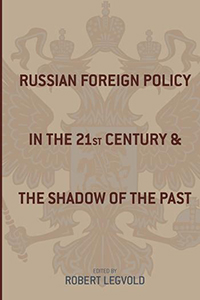
Robert Legvold (red.), Russian Foreign Policy in the 21st Century and the Shadow of the Past
2007
Russia’s international relations, especially with the West, have traditionally been tense. Often, Russia was forced into a position of relative military and economic weakness, leading to resentment and insecurity among Russia’s leadership. In reaction, Russia developed several strategies to secure its position and strengthen itself as much as possible. In Legvold’s collection of essays, a team of historians and political scientists puts Russia’s current foreign policy into a larger historical perspective, laying bare continuity and changes that are then further analysed. Each essay in this collection offers excellent analyses of Russia’s foreign policy, the country’s view on world politics, and its close and often dramatic relationship between domestic and foreign political developments.
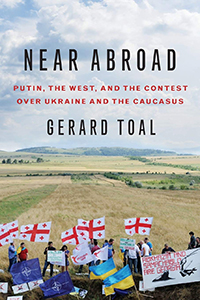
Gerard Toal, Near Abroad. Putin, the West, and the Contest over Ukraine and the Caucasus
2017
The ‘Near Abroad’ – this is how former Soviet Republics (excluding the Baltics) are often referred to in Moscow governmental circles. Russia wants to protect its influence in these regions and preferably expand it, but is often thwarted in its efforts by governments that are less than enthusiastic about Russia’s paternalism, regularly leading to regional governments calling upon Europe, the US or NATO for help. In some extreme instances, these incidents lead to war, like the 2008 war with Georgia, or the 2014 war with Ukraine. Gerard Toal wrote an original and very readable book about these conflicts, in which he puts the Russian perspective front and centre, without accepting it as the only correct view on the matter.
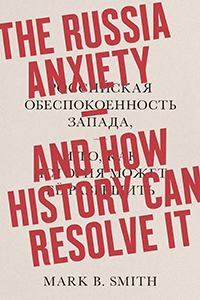
Mark Smith, The Russia Anxiety and How History Can Resolve it
2019
According to historian Mark Smith, Russia might be a special country, but that does not mean it should be held to a special standard. This is a practice that is all too common in Europe and the US. Russia is often depicted as a country that has been in the grips of violence, dictatorships and corruption for such a long time that it has become part of the fabric of society. Why this constant Russia-phobia? Why does Russia elicit such extreme emotional responses? To answer this question, Smith analyses the rich and multifaceted history of Russia, alongside the history of Western thinking about Russia. Russia, he posits, doesn’t behave better or worse than other world powers and hasn’t diverged from this trend in the past. Perhaps recognition of this fact and the different ways westerners have viewed Russia can lead to more grounded conversations and less tension.
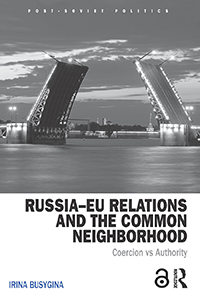
Irina Busygina, Russia–EU Relations and the Common Neighborhood: Coercion vs. Authority
2018
Russia and the EU approach international relations completely differently, according to Irina Busygina. While the EU emphasizes mutual obligations, Russia tries to achieve its goals through (the threat of) violence. Close relationships of both the EU and Russia with states in Eastern Europe leads to friction which is only exacerbated by their differing approaches to foreign relations.
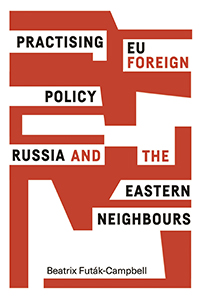
Beatrix Futák-Campbell, Practising EU foreign policy: Russia and the eastern neighbours
2018
What does the EU-Russia relationship look like and how does the EU respond to Russian actions and provocations? To answer these questions, Beatrix Futák-Campbell analysed statements by important players deciding EU foreign policy: the European Council, the European Commission, and members of the European Parliament. This research shows that policymakers often act pragmatically, but are also strongly committed to the European identity, international norms, and security. The study is a contribution from the new field of Discursive International Relations and shows how Europeans think about Russia and its relationship with Europe.
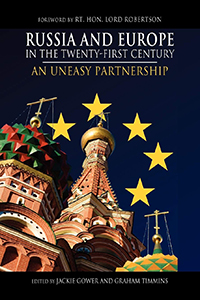
Jackie Gower en Graham Timmins (red.), Russia and Europe in the Twenty-First Century: An Uneasy Partnership
2007
This collection of essays from 2007 reflects on concrete examples of (failed) cooperation between Russia and the West. After the fall of the Soviet Union, there was hope of economic and political collaboration between Russia and Europe, but little of that hope was left come 2007. What went wrong? To answer this question, the book first explores the views Russian leaders have of the West, and subsequently the Western views on Russia. In the third part, some examples of co-operation are reviewed, after which the conclusion grapples with the question of why the partnership between Europe and Russia will probably be an ‘uneasy’ one for the foreseeable future. What sticks out when reading the book in 2021 is that the substantial changes that have occurred in the West over the past decade (Brexit, the rise of Trump) are not yet part of the conversation – the West seems to have changed much more in the past 15 years than Russia has.
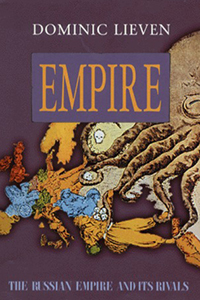
Dominic Lieven, Empire: The Russian Empire and its Rivals
2000
Russia is a national state and a multinational realm. In some ways, Russia is the last remaining empire in Europe. Taking this idea as a starting point, Dominic Lieven wrote a beautiful history of the Russian empire, in which he compares it to its most important contemporary rivals: The British, Ottoman and Habsburgian Empires. Through this comparison, Lieven once again provides a counterargument to the old view that the Russian Empire was different from its contemporary counterparts. Through a broad comparison, it becomes clear how these empires were alike and how they differed. The result is an overview that not only provides a clear history of Russia but a history of the role of empire in Europe as well.
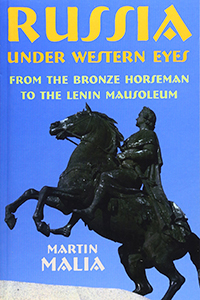
Martin Malia, Russia under Western Eyes: From the Bronze Horseman to the Lenin Mausoleum
1999
In Russia under Western Eyes, historian Martin Malia explores European views on Russia starting in the eighteenth century. Malia dismisses the notion of Russia as the unchanging East as opposed to the dynamic and democratic West. Instead, he posits that Europeans often glorified and vilified Russia without trying to find out what was happening in Russia. Malia deconstructs this view and in doing so analyses the ever-changing relationship between Europe and Russia. In The Soviet Tragedy (1994), Malia passed harsh judgement on the Soviet Union and in 1997 wrote the preface to the English translation to The Black Book of Communism (Le livre noire du communisme, 1997).
Contact your Faculty Liaison
Is a book missing on this list, or would you like UBL to purchase a book about Russian foreign policy or Russia-EU relations that is not yet available in our collections? Contact our faculty liaisons.
